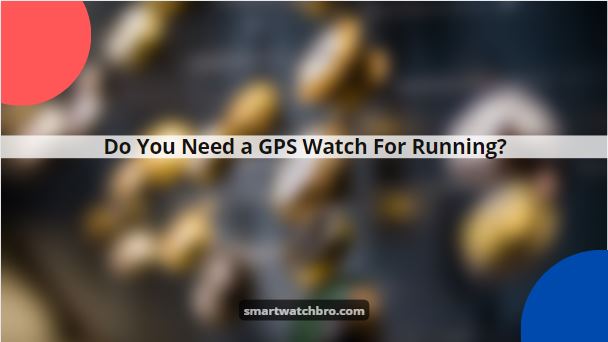GPS watches have quickly gained popularity among runners. But many runners wonder whether they think a GPS watch is necessary. Find out do you need a GPS watch for running here.
Wearing a GPS activity watch is a good idea if you like to run, hike, swim, or ride a bike. However, it is among the best investments for long-distance runners. It is standard protocol for navigation watches to have a GPS runner mode.
You can monitor your run’s pace, duration, and other key metrics for detailed analysis. Keep tabs on your progress while running by using a GPS watch. Furthermore, some watches also offer a swimming mode, along with a cycling mode.

How Does GPS Work on a Smartwatch?
GPS is not just useful for navigation and tracking. It can track distance, time, and pace in a perfectly synchronized fashion.
However, GPS covers a smaller area than GLONASS or Galileo, which are worldwide navigation systems. Distances and other measurements can take with a lot more precision thanks to satellite GPS. GLONASS, the most widely used GPS, boasts outstanding performance.
Moreover, Galileo’s accuracy is superior to both GPS and GLONASS. The GPS alone is ambiguous when combined with exercise time, distance, and pace to report your activity. In this way, satellite GPS protocols can enhance GPS running watch tracking capabilities.
Pros Of GPS Watch
- GPS watch was invented for runners, but there are many other benefits from such a gadget. We take a look at the pros of a GPS watch here.
- Some watches include a built-in GPS that may record your running or walking times, distances, and intervals. The fantastic feature of this app is that it will send updates to your smartphone detailing your pace and interval times while you train for a marathon.
- GPS watches also track your exact GPS coordinates. When you run, hike, camp, or get lost, the GPS can help you locate your way. You’ll always be aware of this watch’s track trail. Your journey can view and copy. However, a GPS watch lets you plan your route to get there quickly.
- Functions improve a nautical watch. Moonrise and sunset hours are displayed on some watches based on location. Shot coordinates are available afterward with automatic shot detection. You’ll be prepared for any trip with local weather trends.
- The design’s original aesthetic shines when accessorized with various vintage forms and hues.
- There is also a GPS watch that offers some features such as calorie and step counters, a compass, integrated flashlights, text and call alerts that can be sent directly to your wrist, changing the volume is easy, and alerts with jolts can send to your wrist.
Cons Of GPS Watch
GPS running watches are an increasingly essential tool for serious runners. But with the pros come the cons. Here are some cons of using a GPS watch.
- They are, without a doubt, pretty pricey.
- If your watch relies on your phone, cellular data, or Wi-Fi to function, you may lose access to its location-based features if you don’t have your phone on you.
- Many GPS watches are not widely adopted due to battery life concerns. GPS functionality might significantly reduce battery life in certain cases.
- Cheaper GPS models suffer from decreased accuracy.
- It’s possible to have a complicated user interface.
Does a GPS watch need Internet?
GPS watches can do a lot; they track your location, speed, etc. You will love to have the innovative smartwatch in your hand if you are a sportsman or fitness freak.
Before buying, many people wondered whether the GPs watch needed internet access. Occasionally, we will have trouble accessing cellular networks.
You don’t have to worry about it since they don’t require the Internet to function. A GPS watch can connect to the Internet wirelessly by itself, without a phone’s help. But the watch needs a data plan to go online.
While a few outdated GPS watches depend on a smartphone for mapping and other features. Make sure to invest in a smartwatch with wireless GPS functionality.
An overview of GPS technology
GPS watches transmit signals to monitor movement. Furthermore, satellites are used to pinpoint your location, so data connections are not required. By sending and receiving satellite signals, you can use watches as signal transmitters and receivers.
GPS is a navigation system comprised of three main components:
- Ground system:
Ground stations receive satellite radio signals to monitor vital signs, geographic position, and time.
- Satellite:
Satellites are used to triangulate the locations.
- Receivers:
Satellite phones, watches, and nav systems all fall under the category of “receivers” because of their ability to monitor their precise location.
As above mention, GPS wristwatches use satellites to monitor your whereabouts in real time. It takes at least four satellites for a GPS receiver to pinpoint your exact location.
With each outing, GPS devices get permanently attached in record time. Satellite-compatible maps are standard on GPS navigators like Google Maps.
A GPS watch’s signal may block in densely wooded or mountainous areas. Trees and high buildings impede transmissions from satellites.
Finally, we have answered your question: Do You Need a GPS Watch for Running? If you want to keep tabs on your running stats, a GPS watch is what you need. Some runners like to use a GPS watch to track their training and racing times meticulously. If you’re a runner, you should get the cutting-edge GPS watch.

